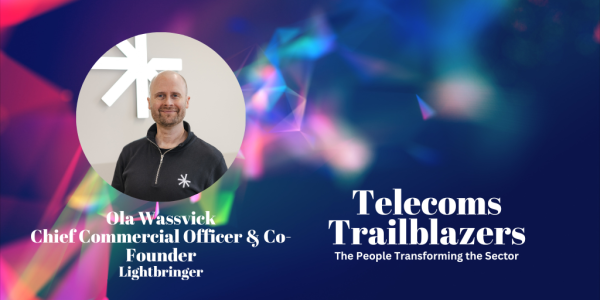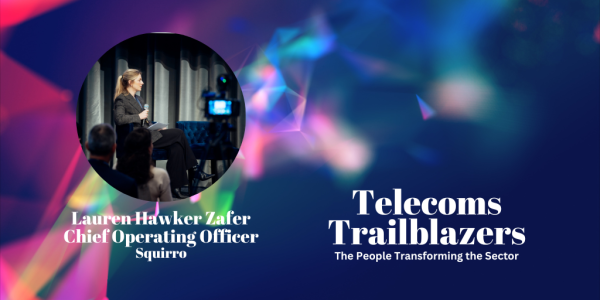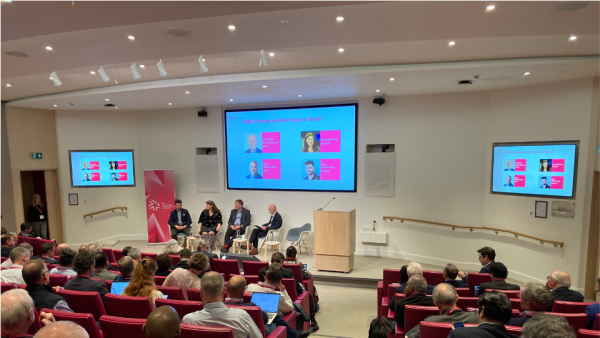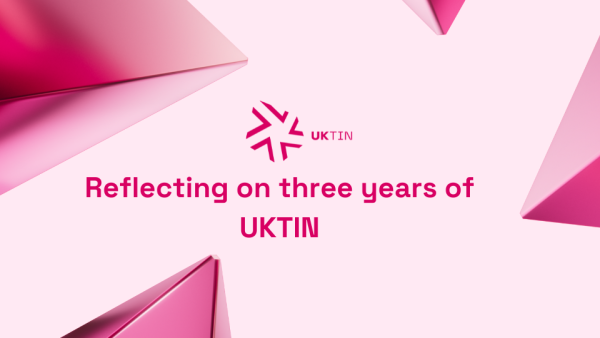
Natalia Lemarquis, CEO of Space Villages, discusses her experience on the UK Telecoms Innovation Network (UKTIN) support programme.
Space Villages is a pioneering start-up in the robotics and space sector, working to deliver an in-orbit servicing and repair spacecraft with the power to offer a more sustainable, cost-effective solution to space maintenance. This robotic spacecraft, RoWo, is designed to supplement the work of astronauts in orbit. Equipped with a robotic arm which can be manipulated in real-time, it is able to repair, service and refuel other spacecraft that suffer “failure” whilst in orbit.
However, perhaps most excitingly, is that this technology is not exclusively applicable to space. It can also be used in remote terrestrial environments like oil, gas and nuclear, to remotely repair infrastructure and oversee its maintenance without the need for in-person activity.
We caught up with Natalia to find out how UKTIN’s workouts have helped her elevate Space Villages to new heights, and why more women should consider a career in this rapidly developing sector.
Tell us about your innovation
2023 alone saw £2.2bn worth of assets fail in orbit (mostly GEO). You would think that modern-day satellites would be pretty reliable, however, particularly in the telecoms sector, it’s quite common for satellite manufacturers to rush delivery of spacecraft and valuable assets in such short timescales, in order to stay competitive. With that, the potential issues can be overlooked in the process.
When deployment failure does happen, particularly if it is already out in orbit, the asset is no longer operable because of common faults like antenna issues or solar panel issues. And unfortunately, there currently isn’t a choice but to move it into the graveyard orbit and replace it. Both operations incur huge costs, and the revenue loss can be enormous. So instead of disposing of the satellite, we’re offering a robotic tool solution to repair the assets or payloads which is both more sustainable and more cost-effective to the business.Why do you think that telecoms is such an exciting sector to be a part of right now?
Well, the sector is growing rapidly. What makes it really exciting is that telecoms has opened up a lot of commercial opportunities not just for those directly operating in the sector, but for those like us who are operating on the fringes too. Companies are beginning to realise that actually, the big industry players cannot do everything themselves and innovate as quickly. Hence, they’re actively on the lookout for solutions emerging from some of the smaller companies like ours. That’s what makes it so exciting because there is a gap in the market to bring an idea forward and apply it to this innovative sector.
Plus, where the sector is growing so rapidly, it opens up opportunities for smaller companies like ours to grow with it and develop our solution in ways that are visibly applicable to the future.- What were some of the key takeaways from UKTIN?
I didn’t realise how much support was actually out there and available to companies like ours. Through UKTIN, we received support in so many different ways, whether that was connecting with people in the technology space, participating in various events or just back-to-basics support to work on our business model.
Listening to the stories of other entrepreneurs through the Innovation and Investment workouts really helped us to benchmark our offer. Even though we’re in a very niche business and our offer wouldn’t necessarily be comparable with theirs, seeing how others structured their answers and pitches was super helpful.
And lastly, for us as a Dutch company registered in the UK and trying to expand our operations, being able to get further connected with the UK infrastructure and gaining insights on which grants we can apply for and the other opportunities available to us was fantastic. These are all things I wouldn’t have known or understood without the support of UKTIN, and it requires a real, thorough understanding of the sector which is something that UKTIN has in abundance.
What has been happening at Space Villages since you completed the workouts?
Excitingly, we’re now looking to raise SEED funding to further develop our robotic tool and test it out in orbit. We also plan to mount it onto a TRL9 platform and begin engaging with our first customers to provide repairs in orbit and robotic solutions. But we’re also very keen to engage with the customers here on Earth to help them de-risk and resolve problems whilst in orbit. The team has been working really hard to reach out to as many customers as possible and start raising the funds required for this next phase in our development.
I think that the next couple of years will be incredibly busy for us because once we secure that funding, we’ll be rolling our sleeves up and hitting the ground running.
As a female working in what is traditionally, a very male-dominated sector, what do you think can be done to encourage more women into the space sector?
This is something very close to my heart actually, as I hope that I can be a voice to encourage more women into space! Our main investor, José Alonso, has really encouraged women into C-Level positions across a number of his companies, which is quite hard to do when we work in such a male-dominated environment. I’m very lucky to progress my career in such a way, and that is something that he feels passionately about doing across his portfolio.
But in terms of what more we can do; I think that showing more role models to women and highlighting that working in the space sector is possible is so important. I understand the challenges women have to face. I’m a Mother of two and know that it takes a lot to manage an ideal work-life balance. But the space industry is very open-minded to making sure that women feel welcome to enter the sector. It’s really quite inspiring and I’m glad that my daughters will one day see that it is possible to strike a balance between work and home life, particularly in such an exciting sector!
It’s also important to remember that the space industry is not only about the astronauts that we see jetting off into orbit. There are so many earth-based opportunities, whether that’s in engineering, the medical side of it, or even law. Highlighting the various needs of the space industry is key to opening people’s eyes to the opportunity that space presents.
Would you recommend the UKTIN programme?
I would strongly encourage everyone to reach out to UKTIN. The programme has been fantastic for a number of things, whether that’s connections, insights or discovering new avenues for your technology. I know how hard it can be as an entrepreneur to access the kind of support that we have received through this programme, so I’d 100% recommend it to fellow businesses and innovators.
UKTIN support has changed!
The training has been re-designed to be as accessible and efficient as possible, maximising your learning while limiting the time you need to spend away from your business.
Both areas of support are delivered online using a mix of self-paced learning, where you decide when and where to engage with the digital course content and live sessions with the trainers, mentors, and a group of peer companies, running across three weeks.









